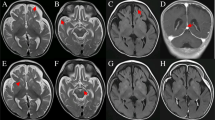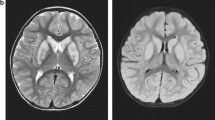Abstract
TPK deficiency, also known as thiamine metabolism dysfunction syndrome 5, is a rare autosomal recessive disorder of inborn error of metabolism caused by TPK1 gene mutation. Its clinical manifestation is highly variable, ranging from spontaneous remission to fatal metabolic crisis. Here, we describe two affected siblings in a Chinese family presenting with recurrent episodes of acute ataxia. Whole exome sequencing identified a homozygous missense variant c.382C > T (p.Leu128Phe) in the TPK gene, which is located in the thiamine binding domain and affects a highly conserved amino acid. Besides, a review of the 18 previously reported patients provides a better understanding of the clinical and genetic features of this disorder. TPK deficiency may be an under-diagnosed cause of acute encephalopathy and ataxia. Given the potential benefit of early intervention, TPK deficiency should be considered in patients with episodic encephalopathy or ataxia, especially those associated with lactic acidosis and α-ketoglutaric aciduria. Significant decreased TPP in the blood is a strong hint of the disease. WES (whole exome sequencing) can help to further identify the molecular diagnosis.



Similar content being viewed by others
References
Banka S, Goede CD, Yue WW et al (2014) Expanding the clinical and molecular spectrum of thiamine pyrophosphokinase deficiency: a treatable neurological disorder caused by TPK1 mutations [J]. Mol Genet Metab 113(4):113 301–306
Brown G (2014) Defects of thiamine transport and metabolism [J]. J Inherit Metab Dis 37(4):577–585
Bugiardini E, Pope S, Feichtinger RG, Poole OV, Pittman AM, Woodward CE, Heales S, Quinlivan R, Houlden H, Mayr JA, Hanna MG, Pitceathly RDS (2019) Utility of whole blood thiamine pyrophosphate evaluation in TPK1-related diseases. J Clin Med 8:991
Fernández-Marmiesse A, Gouveia S, Couce ML (2018) NGS technologies as a turning point in rare disease research. Diagnosis and Treatment Current Medicinal Chemistry 25(3):404–432
Frank RAW, Leeper FJ, Luisi BF (2007) Structure, mechanism and catalytic duality of thiamine-dependent enzymes [J]. Cell Mol Life Sci 64(7–8):892–905
Fraser JL, Vanderver A, Yang S et al (2014) Thiamine pyrophosphokinase deficiency causes a Leigh disease like phenotype in a sibling pair: identification through whole exome sequencing and management strategies. Mol Genet Metab Rep 1:66–70
Huang WJ, Qin J, Liu DD, Wang Y, Shen X, Yang N, Zhou H, Cai XT, Wang ZL, Yu D, Luo R, Sun Q, Xie YM, Jia D (2019 Apr) Reduced thiamine binding is a novel mechanism for TPK deficiency disorder. Mol Gen Genomics 294(2):409–416
Invernizzi F, Panteghini C, Chiapparini L, Moroni I, Nardocci N, Garavaglia B, Tonduti D (2017) Thiamine-responsive disease due to mutation of TPK1: importance of avoiding misdiagnosis. Neurology 89:870–871
Karnebeek CDM, Shevell M, Zschocke J et al (2014) The metabolic evaluation of the child with an intellectual developmental disorder: diagnostic algorithm for identification of treatable causes and new digital resource. Mol Genet Metab 111:428–438
Mahajan A, Sidiropoulos C (2017) TPK1 mutation induced childhood onset idiopathic generalized dystonia: report of a rare mutation and effect of deep brain stimulation. J Neurol Sci 376:42–43
Mayr J, Freisinger P, Schlachter K et al (2011) Thiamine pyrophosphokinase deficiency in encephalopathic children with defects in the pyruvate oxidation pathway [J]. Am J Hum Genet 89(6):806–812
Muller Y, Schulz G (1993) Structure of the thiamine and Flavin dependent enzyme pyruvate oxidase [J]. Science 259(5097):965–967
Nyhan WL, McGowan K, Barshop BA (2019) Thiamine phosphokinase deficiency and mutation in TPK1 presenting as T biotin responsive basal ganglia disease. Clin Chim Acta 499:13–15
Ortigoza-Escobar JD, Alfadhel M, Molero-Luis M et al (2017) Thiamine deficiency in childhood with attention to genetic causes: Survival and outcome predictors [J]. Ann Neurol 82:317–330
Zhu L, Wu RJ, Ye ZL, Gu R, Wang Y, Hou Y, Feng Z, Ma X (2019) Identification of two novel TPK1 gene mutations in a Chinese patient with thiamine pyrophosphokinase deficiency undergoing whole exome sequencing. J Pediatr Endocrinol Metab 32(3):295–300
Author information
Authors and Affiliations
Corresponding author
Ethics declarations
Conflict of Interest
The authors declare that they have no conflict of interests.
Informed Consent
The study was approved by the ethics committee of The First Affiliated Hospital of Xiamen University, and written informed consent was obtained from the parents.
Additional information
Publisher’s Note
Springer Nature remains neutral with regard to jurisdictional claims in published maps and institutional affiliations.
Rights and permissions
About this article
Cite this article
Zhu, B., Wu, J., Chen, G. et al. Whole Exome Sequencing Identifies a Novel Mutation of TPK1 in a Chinese Family with Recurrent Ataxia. J Mol Neurosci 70, 1237–1243 (2020). https://doi.org/10.1007/s12031-020-01568-x
Received:
Accepted:
Published:
Issue Date:
DOI: https://doi.org/10.1007/s12031-020-01568-x




